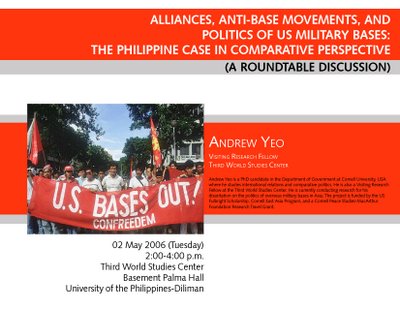
Alliances, Anti-Base Movements, and the Politics of US Military Bases: The Philippine Case in Comparative Perspective (A Roundtable Discussion)
Andrew Yeo
Visiting Research Fellow
Third World Studies Center
02 May 2006 (Tuesday)
2:00-4:00 p.m.
Third World Studies Center
Basement Palma Hall
University of the Philippines-Diliman
ABSTRACT
Does civil society have any voice in matters concerning military and security policy? Based on the strategic interests of the United States (US), overseas basing policies are decided between the US and host government elites. However, with the development of domestic and transnational anti-base coalition movements, civil society has played an increasing role in the politics of overseas military bases. What, then, is the impact of anti-base movements on US basing policies? And why, despite successful mobilization, are some anti-base movements less effective than others? Exploring the role of security alliances in state-civil society relations, the roundtable focuses on the research findings on the anti-base movements in the Philippines and its relations to US alliances and anti-base movements in South Korea and Japan.
_____________________________________________
Andrew Yeo is a PhD candidate in the Department of Government at Cornell University, USA where he studies international relations and comparative politics. He is also a Visiting Research Fellow at the Third World Studies Center. He is currently conducting research for his dissertation on the politics of overseas military bases in Asia. The project is funded by the US Fulbright Scholarship, Cornell East Asia Program, and a Cornell Peace Studies-MacArthur Foundation Research Travel Grant.



No comments:
Post a Comment